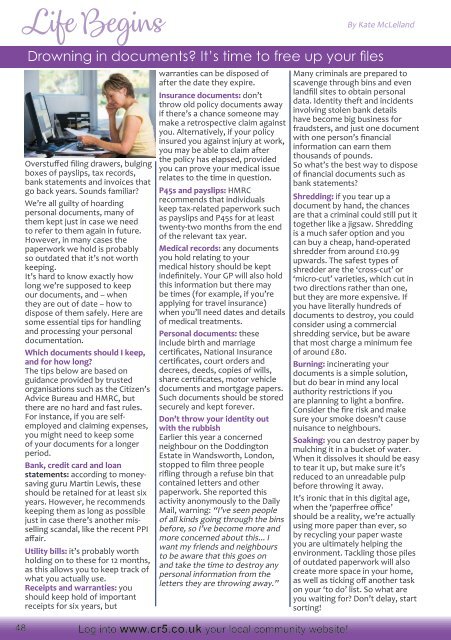CR5 Issue 160 Sept 2018
A local community magazine delivered free to 11,600 homes every month in the CR5 postcode. Contains local business advertising, interesting reads, What's on in the community and puzzles.
A local community magazine delivered free to 11,600 homes every month in the CR5 postcode. Contains local business advertising, interesting reads, What's on in the community and puzzles.
Create successful ePaper yourself
Turn your PDF publications into a flip-book with our unique Google optimized e-Paper software.
Life Begins<br />
By Kate McLelland<br />
Drowning in documents? It’s time to free up your files<br />
Overstuffed filing drawers, bulging<br />
boxes of payslips, tax records,<br />
bank statements and invoices that<br />
go back years. Sounds familiar?<br />
We’re all guilty of hoarding<br />
personal documents, many of<br />
them kept just in case we need<br />
to refer to them again in future.<br />
However, in many cases the<br />
paperwork we hold is probably<br />
so outdated that it’s not worth<br />
keeping.<br />
It’s hard to know exactly how<br />
long we’re supposed to keep<br />
our documents, and – when<br />
they are out of date – how to<br />
dispose of them safely. Here are<br />
some essential tips for handling<br />
and processing your personal<br />
documentation.<br />
Which documents should I keep,<br />
and for how long?<br />
The tips below are based on<br />
guidance provided by trusted<br />
organisations such as the Citizen’s<br />
Advice Bureau and HMRC, but<br />
there are no hard and fast rules.<br />
For instance, if you are selfemployed<br />
and claiming expenses,<br />
you might need to keep some<br />
of your documents for a longer<br />
period.<br />
Bank, credit card and loan<br />
statements: according to moneysaving<br />
guru Martin Lewis, these<br />
should be retained for at least six<br />
years. However, he recommends<br />
keeping them as long as possible<br />
just in case there’s another misselling<br />
scandal, like the recent PPI<br />
affair.<br />
Utility bills: it’s probably worth<br />
holding on to these for 12 months,<br />
as this allows you to keep track of<br />
what you actually use.<br />
Receipts and warranties: you<br />
should keep hold of important<br />
receipts for six years, but<br />
warranties can be disposed of<br />
after the date they expire.<br />
Insurance documents: don’t<br />
throw old policy documents away<br />
if there’s a chance someone may<br />
make a retrospective claim against<br />
you. Alternatively, if your policy<br />
insured you against injury at work,<br />
you may be able to claim after<br />
the policy has elapsed, provided<br />
you can prove your medical issue<br />
relates to the time in question.<br />
P45s and payslips: HMRC<br />
recommends that individuals<br />
keep tax-related paperwork such<br />
as payslips and P45s for at least<br />
twenty-two months from the end<br />
of the relevant tax year.<br />
Medical records: any documents<br />
you hold relating to your<br />
medical history should be kept<br />
indefinitely. Your GP will also hold<br />
this information but there may<br />
be times (for example, if you’re<br />
applying for travel insurance)<br />
when you’ll need dates and details<br />
of medical treatments.<br />
Personal documents: these<br />
include birth and marriage<br />
certificates, National Insurance<br />
certificates, court orders and<br />
decrees, deeds, copies of wills,<br />
share certificates, motor vehicle<br />
documents and mortgage papers.<br />
Such documents should be stored<br />
securely and kept forever.<br />
Don’t throw your identity out<br />
with the rubbish<br />
Earlier this year a concerned<br />
neighbour on the Doddington<br />
Estate in Wandsworth, London,<br />
stopped to film three people<br />
rifling through a refuse bin that<br />
contained letters and other<br />
paperwork. She reported this<br />
activity anonymously to the Daily<br />
Mail, warning: “I’ve seen people<br />
of all kinds going through the bins<br />
before, so I’ve become more and<br />
more concerned about this... I<br />
want my friends and neighbours<br />
to be aware that this goes on<br />
and take the time to destroy any<br />
personal information from the<br />
letters they are throwing away.”<br />
48 Log into www.cr5.co.uk your local community website!<br />
Many criminals are prepared to<br />
scavenge through bins and even<br />
landfill sites to obtain personal<br />
data. Identity theft and incidents<br />
involving stolen bank details<br />
have become big business for<br />
fraudsters, and just one document<br />
with one person’s financial<br />
information can earn them<br />
thousands of pounds.<br />
So what’s the best way to dispose<br />
of financial documents such as<br />
bank statements?<br />
Shredding: if you tear up a<br />
document by hand, the chances<br />
are that a criminal could still put it<br />
together like a jigsaw. Shredding<br />
is a much safer option and you<br />
can buy a cheap, hand-operated<br />
shredder from around £10.99<br />
upwards. The safest types of<br />
shredder are the ‘cross-cut’ or<br />
‘micro-cut’ varieties, which cut in<br />
two directions rather than one,<br />
but they are more expensive. If<br />
you have literally hundreds of<br />
documents to destroy, you could<br />
consider using a commercial<br />
shredding service, but be aware<br />
that most charge a minimum fee<br />
of around £80.<br />
Burning: incinerating your<br />
documents is a simple solution,<br />
but do bear in mind any local<br />
authority restrictions if you<br />
are planning to light a bonfire.<br />
Consider the fire risk and make<br />
sure your smoke doesn’t cause<br />
nuisance to neighbours.<br />
Soaking: you can destroy paper by<br />
mulching it in a bucket of water.<br />
When it dissolves it should be easy<br />
to tear it up, but make sure it’s<br />
reduced to an unreadable pulp<br />
before throwing it away.<br />
It’s ironic that in this digital age,<br />
when the ‘paperfree office’<br />
should be a reality, we’re actually<br />
using more paper than ever, so<br />
by recycling your paper waste<br />
you are ultimately helping the<br />
environment. Tackling those piles<br />
of outdated paperwork will also<br />
create more space in your home,<br />
as well as ticking off another task<br />
on your ‘to do’ list. So what are<br />
you waiting for? Don’t delay, start<br />
sorting!

















